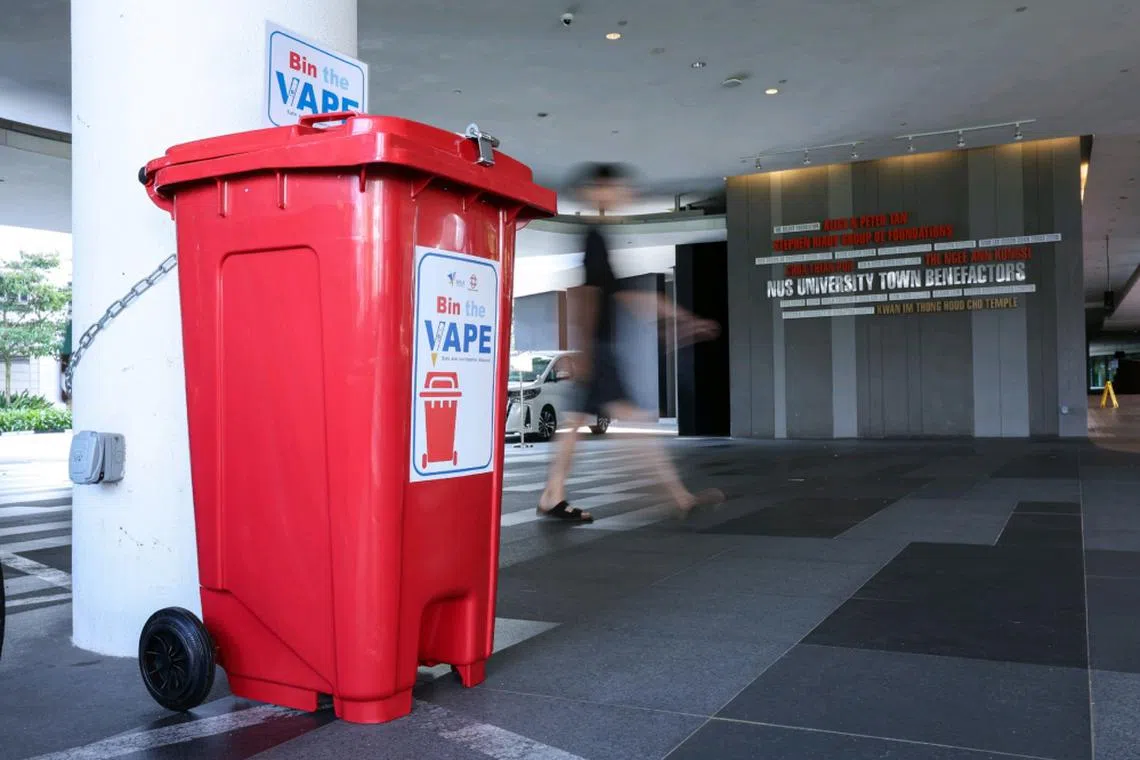3,100 students on average caught vaping yearly from 2022 to 2024; stricter penalties from Sept 1
Sign up now: Get ST's newsletters delivered to your inbox

Disciplinary actions in schools include suspension, detention and caning for boys. Recalcitrant offenders will face stiffer consequences.
ST PHOTO: BRIAN TEO
- Vape cases in Singapore's higher education institutes have sharply increased, prompting stricter measures starting on Sept 1.
- Disciplinary actions will be intensified, including detention, caning, suspension, and dismissal for repeat offenders.
- MOE will enhance education, outreach, and enforcement, including detector trials and saliva tests, to combat vaping.
AI generated
SINGAPORE - On average, about 3,100 students were caught for vaping offences annually from 2022 to 2024 in primary schools, secondary schools, junior colleges and Millennia Institute.
A spokesman for the Ministry of Education (MOE) told The Straits Times that the rise was due to intensified enforcement efforts.
At institutes of higher learning (IHLs) – the Institute of Technical Education, five polytechnics and six autonomous universities – about 800 students were caught annually during the same period.
This marks a sharp increase from the fewer than 50 cases across both schools and IHLs before 2020.
Amid these rising figures and a strengthened national push to curb vaping
“Schools will mete out disciplinary action, adjust the conduct grade of the student offender, and take educative and rehabilitative measures,” said Education Minister Desmond Lee, who announced stricter measures on Aug 28 at a press conference on the whole-of-government commitment to tackle vaping.
These intensified disciplinary measures by schools and institutions, which range from detention to withdrawal of scholarships, are on top of the penalties imposed by the Health Sciences Authority (HSA).
Disciplinary actions in schools include suspension, detention and caning for boys. Recalcitrant offenders will face stiffer consequences.
In IHLs, students could be fined, face community service orders, and have privileges such as leadership and overseas exchange opportunities and scholarships withdrawn.
Hostel residents in IHLs caught for vape-related offences will be evicted, while recalcitrant offenders and vape traffickers face suspension or dismissal.
Mr Lee said MOE will support the broader national efforts to address the local vaping scourge in two ways – by ramping up education in schools and outreach to parents, and strengthening enforcement.
The ministry is working with HSA to empower and train designated staff in schools and IHLs, so that they can help carry out appropriate enforcement measures effectively and in a timely manner.
The higher fines for vape consumption kicking in on Sept 1 will also apply to young offenders.
First-time vape offenders below the age of 18 will be fined $500, up from $300. Adults will be fined $700, up from $500.
Recalcitrant vapers will be required to attend weekly rehabilitation for a month, run by the Health Promotion Board. The subsequent two months will involve monthly reporting.
“If they default, they will be charged and subject to a fine of $2,000,” said Health Minister Ong Ye Kung during the press conference.

Sending a strong message to youth and families
Given that the majority of vape abusers are young people, Mr Lee said preventive messaging through education and outreach is important, alongside enforcement.
“The key is to get right to the head and the heart of our young people, our students, amidst all the misinformation and misunderstandings out there... about etomidate and vaping,” he said.
“So that they avoid, so that they refuse, so that they know how to say no, including to peers who try to influence them... I think that is the best defence for our children and our youth.”
MOE will amplify education and outreach efforts, he said, which currently comprise curriculum and assembly talks in schools to teach students about the ills of vapes and etomidate-laced vapes, or Kpods.
At IHLs, preventive education on vaping is covered in compulsory modules, mandatory orientation modules and outreach talks.
Mr Lee also stressed the importance of positive peer support, and encouraged students to refer peers who are struggling with vaping to trusted adults like teachers for timely intervention and assistance.
He said: “It’s not about getting anyone in trouble, but making sure that their friends get the much-needed help that they need.”
Detecting vapes in schools
Mr Lee said some schools are also trying out methods like detectors to nab students with vapes, and more testing of such devices will be needed to ensure they are effective before they can be used more widely.
“These are efforts that MOE will support. If our IHLs want to try things, they need to be evidence-based. They have to be effective,” he said.
But he noted that some vape detectors may produce false positives.
For example, air purifiers have been known to trigger vape detector alarms.
Schools also have saliva test kits for nicotine, but students suspected of etomidate vaping will be sent to HSA for urine testing, said Mr Lee.
In response to ST’s queries, an MOE spokesman said that since March 2025, the ministry has issued nicotine test kits to about 260 schools upon request.
The quick saliva nicotine test kit is a means to check if a student has been smoking or vaping.
“We will do what we can, but ultimately, we need a whole-of-society effort. Parents play a very important role in preventing their children from vaping and consuming drugs,” said Mr Lee, adding that this can be done by having open conversations with their children, looking out for troubling behaviour, and getting help.




